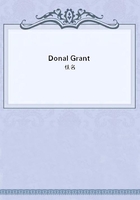
第26章
On the other side a few steps rose to a watch-tower--a sort of ornate sentry-box in stone, where one might sit and regard with wide vision the whole country. Avoiding this, another step or two led them to the roof of the castle--of great stone slabs. A broad passage ran between the rise of the roof and a battlemented parapet.
By this time they came to a flat roof, on to which they descended by a few steps. Here stood two rough sheds, with nothing in them.
"There's stowage!" said the old man.
"Yes, indeed!" answered Donal, to whom the idea of his aerie was growing more and more agreeable. "But would there be no objection to my using the place for such a purpose?"
"What objection?" returned his guide. "I doubt if a single person but myself knows it."
"And shall I be allowed to carry up as much as I please?"
"I allow you," said the butler, with importance. "Of course you will not waste--I am dead against waste! But as to what is needful, use your freedom.--Dinner will be ready for you in the schoolroom at seven."
At the door of his room the old man left him, and after listening for a moment to his descending steps, Donal re-entered his chamber.
Why they put him so apart, Donal never asked himself; that he should have such command of his leisure as this isolation promised him was a consequence very satisfactory. He proceeded at once to settle himself in his new quarters. Finding some shelves in a recess of the wall, he arranged his books upon them, and laid his few clothes in the chest of drawers beneath. He then got out his writing material, and sat down.
Though his window was so high, the warm pure air came in full of the aromatic odours rising in the hot sunshine from the young pine trees far below, and from a lark far above descended news of heaven-gate.
The scent came up and the song came down all the time he was writing to his mother--a long letter. When he had closed and addressed it, he fell into a reverie. Apparently he was to have his meals by himself: he was glad of it: he would be able to read all the time! But how was he to find the schoolroom! Some one would surely fetch him! They would remember he did not know his way about the place! It wanted yet an hour to dinner-time when, finding himself drowsy, he threw himself on his bed, where presently he fell fast asleep.
The night descended, and when he came to himself, its silences were deep around him. It was not dark: there was no moon, but the twilight was clear. He could read the face of his watch: it was twelve o'clock! No one had missed him! He was very hungry! But he had been hungrier before and survived it! In his wallet were still some remnants of oat-cake! He took it in his hand, and stepping out on the bartizan, crept with careful steps round to the watch-tower.
There he seated himself in the stone chair, and ate his dry morsels in the starry presences. Sleep had refreshed him, and he was wide awake, yet there was on him the sense of a strange existence. Never before had he so known himself! Often had he passed the night in the open air, but never before had his night-consciousness been such! Never had he felt the same way alone. He was parted from the whole earth, like the ship-boy on the giddy mast! Nothing was below but a dimness; the earth and all that was in it was massed into a vague shadow. It was as if he had died and gone where existence was independent of solidity and sense. Above him was domed the vast of the starry heavens; he could neither flee from it nor ascend to it!
For a moment he felt it the symbol of life, yet an unattainable hopeless thing. He hung suspended between heaven and earth, an outcast of both, a denizen of neither! The true life seemed ever to retreat, never to await his grasp. Nothing but the beholding of the face of the Son of Man could set him at rest as to its reality; nothing less than the assurance from his own mouth could satisfy him that all was true, all well: life was a thing so essentially divine, that he could not know it in itself till his own essence was pure!
But alas, how dream-like was the old story! Was God indeed to be reached by the prayers, affected by the needs of men? How was he to feel sure of it? Once more, as often heretofore, he found himself crying into the great world to know whether there was an ear to hear. What if there should come to him no answer? How frightful then would be his loneliness! But to seem not to be heard might be part of the discipline of his darkness! It might be for the perfecting of his faith that he must not yet know how near God was to him!
"Lord," he cried, "eternal life is to know thee and thy Father; I do not know thee and thy Father; I have not eternal life; I have but life enough to hunger for more: show me plainly of the Father whom thou alone knowest."
And as he prayed, something like a touch of God seemed to begin and grow in him till it was more than his heart could hold, and the universe about him was not large enough to hold in its hollow the heart that swelled with it.
"God is enough," he said, and sat in peace.